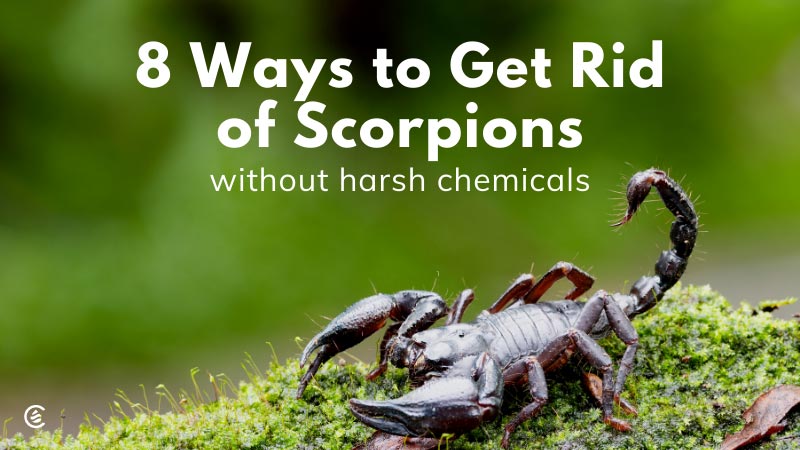
Scorpions are one of our planet’s great survivors. From scorching temperatures to below-freezing conditions, scorpions can thrive in almost any environment. It can be very difficult to get rid of scorpions.
Having existed for over 400 million years, there are now over 1,700 species of scorpion—these predatory arachnids can be found on every continent in the world except for Antarctica. In the U.S., scorpions are mostly limited to the Southwest, such as Arizona, Texas, California and New Mexico.
Unfortunately for those living in these areas, scorpions can be difficult to eliminate. In fact, some scorpions can go anywhere from six to twelve months without food, and because they’re nocturnal and active almost exclusively at night, they can be hard to properly control.
The good news, however, is that scorpions are not nearly as dangerous as people think, with most encounters being no more harmful than a bee or wasp sting. The better news is that by taking preventative measures and using various natural methods, a scorpion problem can be prevented or outright solved. Follows these 8 simple guidelines to get rid of scorpions naturally.
1. GET RID OF ALL THE BUGS
The first and most crucial step to controlling scorpions is general pest and insect control. By removing the scorpions’ food source, you can send these venomous arachnids packing.
When it comes to scorpions, we advise creating a repellent barrier around both your house and yard using an eco-friendly, non-toxic outdoor pesticide. Be sure to spray around your home’s foundation and along fence lines (this treatment should be done twice a month until the problem is resolved).
Non-toxic indoor pesticides can be used to kill individuals that have found their way into the home, and as a preventative measure to treat doorways, windowsills and baseboards.
2. MAINTAIN YOUR YARD
Keeping a clean and well-organized yard will go along way toward safeguarding your home against scorpions. Vulnerable to dehydration—and therefore extreme heat and sun exposure—scorpions require shady, cool places to hide during the daytime before emerging to hunt at night. Make sure to do the following:
- Keep bushes and small trees landscaped. Do not allow them to overgrow and touch the outside walls of your home—scorpions use these as bridges to enter through windows or other small openings.
- Keep grass & other vegetation short and trim.
- De-clutter your yard, removing all unnecessary items: including brush, debris, decorative rocks, woodpiles, lawn equipment, etc.
3. CLEAN INSIDE YOUR HOME
Just as crucial as de-cluttering your yard is keeping your home clean and organized. Clean—because crumbs attract bugs which in turn attract predators like scorpions. Organized—because scorpions will use everything from shoes to boxes to piles of clothing to hide. Traditionally cluttered spaces like closets and underneath beds will require attention, too.
4. SEAL YOUR HOME
Scorpions require openings no bigger than a credit card to enter your home. Windows, baseboards, doorways, light-switches, outlets, fixtures, wall & foundation cracks, and even ceiling fans are all potential scorpion entrances. Seal your home by remedying these cracks and openings using caulk (don’t forget to check basements and attics, too!). The same process should be repeated outdoors as well, paying close attention to the roof and any foundation/wall cracks & holes. Screens or seals should be used to ensure windows and doorways remain firmly shut, too. This will help get rid of scorpions in your home.
5. ELIMINATE ALL EXCESS MOISTURE
Scorpions are prone to moisture loss and usually enter homes as a way to find water or cool down. Whether inside or outside your home, it’s important to remove puddles, standing water, and any other sources of moisture. Plumbing, basements and crawl spaces should also be kept dry and free of leaks.
6. STICKY TRAPS
Those sticky traps used to catch mice and small rats can be re-purposed as scorpion traps. Place them along common entryways, near possible water sources, and in other dark, cool spaces like closets and underneath furniture. Caution: some sticky traps contain synthetic pesticides and other toxins; for the safety of your pets and family, be sure to only purchase the non-toxic versions.
7. DIY BURLAP TRAP
A moistened burlap sack makes for an effective scorpion trap. Simply wet the sack and place it in scorpion trouble areas like basements, attics or just outside your home. Leave the bag opened and in place overnight and check it in the morning (be extremely careful when checking both inside and underneath the bag—scorpions pack a nasty sting!). Repeat this process until you no longer see scorpions in or around your home & lawn.
8. ESSENTAIL OILS
Lavender, cinnamon, peppermint and cedar are all essential oils said to deter scorpions. These can be diluted with the carrier oil of your choice and sprayed along scorpion problem areas and entry points—such as baseboards, windowsills, doorways, and around the perimeter of your home. Aim for about 10% essential oil content, and avoid spraying plants and stainable surfaces, as both can potentially be damaged by home-formulated essential oils mixes.


